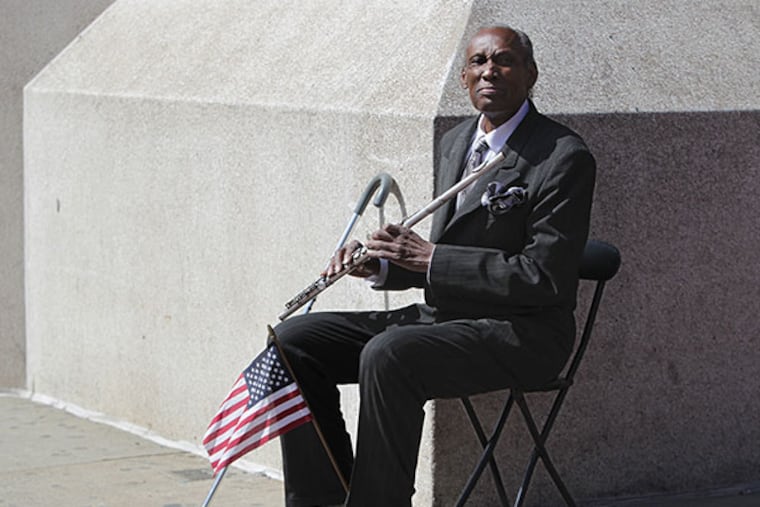Let freedom ring and street musicians play
A local street musician claims he was assaulted for playing music.

FELIX WILKINS cuts a fine figure in his black suit, attentively accessorized with a silky gray handkerchief and matching tie.
Appearance is important to the 72-year-old classically trained flutist turned street musician, even if his audiences are pedestrians racing to lunch, heading to court or trying to find the convention center.
"If you dress right, look right and play right, everything comes out positive," he says.
At least twice a week, Wilkins chooses between his two suits - one black, one brown - and heads out to play at one of his customary spots outside Reading Terminal.
Wilkins, a retired music teacher whose only source of income is a modest Social Security check and whatever he makes busking, used to have more suits. But a while back he got sick and couldn't play, so he couldn't afford to get his suits back from the cleaners. By the time he had enough money, they were gone.
"Yeah, I'm going to have to get me some new suits," he says. But until then, Wilkins dons what he has to play for appreciative audiences, as often as his health and weather allows.
That's what he was doing at 12th and Filbert on the afternoon of Jan. 19, and then again on March 9 when Wilkins says he was assaulted by Reading Terminal Market security guards and Philadelphia police.
As Wilkins played his prized Yamaha silver head flute - a gift from a student's grateful father - Wilkins says two market guards told him to beat it.
Wilkins tried to tell them he was allowed to play there. "But they wouldn't listen," he says.
Besides having a well-worn copy of the city's public music ordinance tucked into his violin case, Wilkins also had experience behind him. Twice the city has settled with Wilkins over misinformed police arresting him and other street musicians in a spate of well-publicized cases.
In 2007, Wilkins won a settlement with the city after he was arrested for playing the flute on a Center City corner. As part of the agreement, a memo went out to police officers that the ability to play a musical instrument or sing in a public place and solicit funds are forms of expression protected by the First Amendment.
Someone better dust that memo off and send it out again.
After hassling and accosting Wilkins on Jan. 19, security guards flagged down police officers driving by in a patrol wagon. When the cops put him in handcuffs, an officer kicked him on the ground. His flute was also damaged. Wilkins says he thought he was being arrested. But a few minutes later, the doors of the patrol wagon swung open and he was dropped off at LOVE Park.
"Stay here," Wilkins says the cops told him. "You'll make more money here anyway."
Incensed, Wilkins walked back to the terminal and continued to play.
Three days later, Wilkins went to the Albert Einstein Medical Center emergency room with finger, shoulder and back pain, hospital records show, that he says he suffered during the arrest.
Wilkins said he was accosted at 12th and Arch on March 9 by one of the same market guards. That time he says he played the "Star-Spangled Banner" as loud as he could while the guard kicked his case and belongings into the street.
"I wanted to send a message, that this is America and I had rights," Wilkins said.
But in case they didn't get the message through his patriotic song, Wilkins has also filed a civil lawsuit against Reading Terminal Market and the Pennsylvania Convention Center Authority. He also plans to sue at least two Philadelphia cops.
Evan Shingles, Wilkins' lawyer, has successfully represented other street musicians during a period of acute police scrutiny over public performances.
"There are a lot of good cops in the city, but the callousness shown here is frightening," Shingles said. "They kidnapped and assaulted this elderly gentleman. They ignored his rights. It's crazy."
When I called the market and the Police Department, it was clear there was some confusion, and various interpretations, of the rights of Philadelphia street musicians.
Paul Steinke, general manager of the Reading Terminal Market, said he couldn't comment specifically about Wilkins because of the pending litigation. But he said his understanding of the city ordinance as explained by police is that musicians are allowed to play but not allowed to solicit.
Except that wasn't exactly what I got from police spokesman Lt. John Stanford, who has referred the case to Internal Affairs.
"There is supposed to be an understanding that as long as they are not interfering with business or causing some disruption or harm to pedestrian traffic, they are allowed to play," Stanford said. He said the department would reiterate that message to the rank and file.
Steinke said he would seek further clarification about the city's policy on street musicians.
"Our goal is to be respectful, but there has to be some order," he said.
Meanwhile, Wilkins is back on the streets, doing what he loves.
"I just want to play without being harassed," he said. "That's my right."
Phone: 215-854-5943
On Twitter: @NotesFromHel